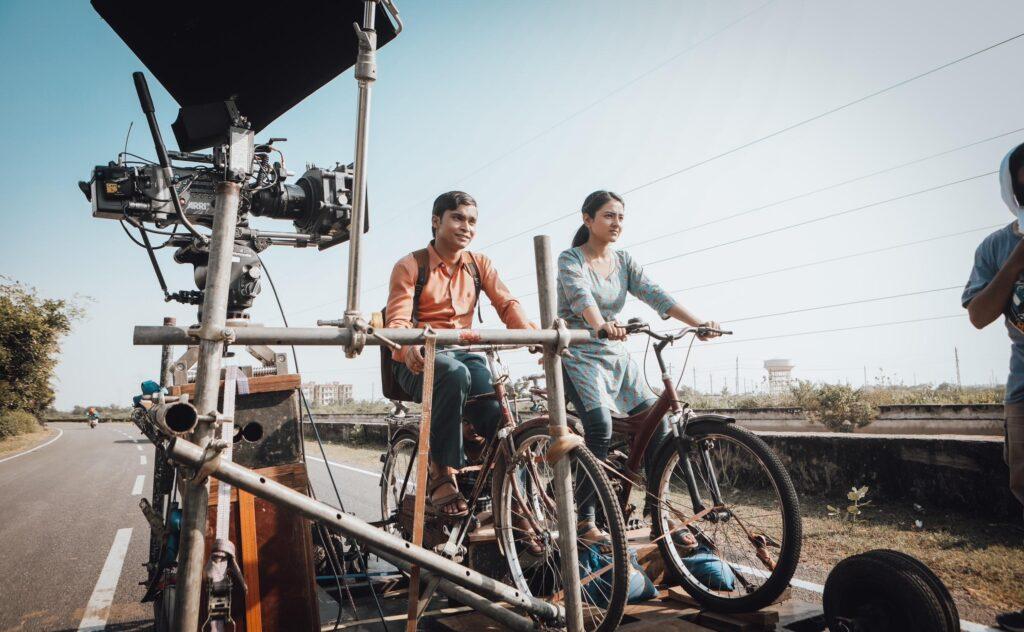Beyond the tale of a confused IIT aspirant, All India Rank offers an intriguing, gentle take on ‘control’ and ‘freedom’, writes Srivathsan Nadadhur
Writer-lyricist Varun Grover’s directorial debut All India Rank is the closest a filmmaker could come to making a cinematic equivalent of ‘Papa kehte hain..’. Vivek’s life at an IIT coaching institute begins with a trivia connecting the popular Jo Jeeta Wohi Sikandar number to author, physicist HC Verma. Mansoor Khan, the director of the film and HC Verma were products of IIT.
Anything that the Lucknowi father discusses with Vivek loosely translates to ‘IIT..IIT and IIT.’ The father, a government jobholder, has big dreams for his teenage son but doesn’t bother listening to him. A diabetic mother, who runs an STD booth, plays her part as the ice-breaker in the household. The tale alternates between a sleepy colony in Lucknow and Kota in 1997.
Studying in IIT is the gateway to success in life, the teacher exclaims as a new batch of students is groomed for one of the most difficult entrance exams in the country. ‘Dimak mein baraf aur dil mein aag..’ is the mantra that Kota’s elite coaching institute swears by. At 17, Vivek is lost in the rat race, trying to make sense of parental pressure, career goals, adolescence and newer friendships.
The protagonist, through a voice-over, vents that his story is all about control – a father who makes all the decisions in the house, a mother who has no control over her love for sweets besides an intriguing connection to Euler’s formula. The story, set in 1997, a year when India is celebrating 50 years of independence, is as much about freedom (or the lack of it) in the lives of its pivotal characters.

Vivek is leaving his house for the first time and Kota places him out of his comfort zone. While he aims to be the incorruptible, dutiful son, he comes to his own gradually and embraces the first taste of freedom. He can afford to breathe easy. There’s none to keep a watch over his ‘nocturnal’ adventures with friends, academic schedules and obsession with video games.
For both the parents, who sweat day and night to provide Vivek with a strong academic foundation, it’s a chance to be a ‘couple’ again and find solace amongst themselves and their sweet little nothings. Providing a glimpse of the country’s socio-political climate, there’s hullabaloo over a tricolour cake for August 15; a government official is uncomfortable with ‘azaadi’ because it’s an Urdu word.
While the tale of a confused IIT aspirant and the coming-of-age motif has been consistently explored in the Indian digital space and cinema at various levels, All India Rank is equally interested in understanding what the parent goes through – psychologically and financially. There’s a smartly structured subplot where parents look beyond the rose-tinted view of life in IIT.

All India Rank’s charm lies in its innocence and the grounded, simplistic treatment of an average boy’s story. There are no broad strokes, no mega speeches, conflicts or resolutions. That’s the issue too; you look for more vigour and spirit to make the proceedings livelier. Like Vivek’s leisurely cycle rides, the film is too comfortable, content in its unhurried pace, tapping into 90s nostalgia.
The director needlessly lends a tragic twist to a key character’s life in Kota, something the film could’ve done better without. Thankfully, All India Rank doesn’t try to be an explainer – the film is just a bunch of episodes in a boy’s life over a year. The happy ending isn’t about Vivek’s admission into IIT – it’s about a father calming his son’s nerves, patting him on his shoulder before the entrance.

Bodhisattva Sharma’s major task as a performer in the film is to keep his emotions under check, not react too much but do enough to express Vivek’s mindscape. Much like Vivek, he comes of age as an actor beyond his boyish appeal, showcasing a different dimension of his capabilities after Paatal Lok, Rana Naidu. Samta Sudiksha, Neeraj Singh and Vidit Singh shine while they last.
However, the film holds its ground primarily because of the seniors – Vivek’s on-screen parents, Shashi Bhushan and Geeta Agarwal Sharma, who play the innocent, average middle-class parents lost in their domesticity. Sheeba Chaddha brings life to many snappy, colourful one-liners, though the scope of the character is quite limited in the narrative.
All India Rank has a minimalistic yet alluring soundtrack; the variety Mayukh and Mainak offer, from Noodle Sa Dil to Theher Zara to Not A Dream, is quite promising. As a writer behind dense films like Masaan, Sandeep Aur Pinky Faraar, Varun Grover proves he may be equally good at bringing a gentle tale like All India Rank to life as a director.












